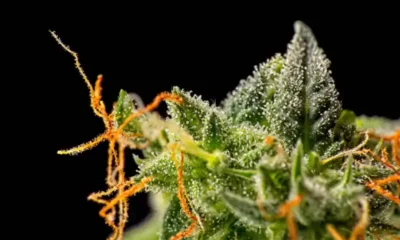Connect with us
Published
5 months agoon

Most pet owners are already well aware that many of our human vices don’t translate well to our four-legged friends. As cannabis continues to become more accessible and reform spreads throughout the West and beyond, it only makes sense that our pets have a larger collective risk of exposure.
The Pet Poison Helpline recently released its list of the Top 10 Pet Poisons, and while cats don’t seem to be drawn to cannabis overall, cannabis made the list for dogs along with the all-species list. The helpline did note that chocolate, a sweet treat infamously known for its toxicity among pets, has crossover appeal when it comes to both dogs and cats.
The Pet Poison Helpline is a 24-hour animal poison control service offering support throughout the U.S., Canada and the Caribbean for all species of animals, including dogs, cats, birds, small mammals, large animals, and exotic species. Dogs take up the bulk of calls at 88%, while 11% are cat-related. The remaining 1% goes toward support of other species.
The full top 10 list, from top to bottom, for the most common pet poisons for species is: chocolate, grapes/raisins, Ibuprofen, xylitol (a natural sugar alcohol found in many fruits and vegetables often used as a sugar substitute), bromethalin/rat poison, cannabis, allium species produce (including onions, chives, leeks, and shallots), anticoagulant rat poison, vitamin D3 supplement and the pain medication carprofen.
Senior Pet Poison Helpline veterinary toxicologist Dr. Renee Schmid highlighted that chocolate topped the list once again for all species. Even though it’s widely known that chocolate is toxic to pets, “they constantly find a way,” Schmid said. “While chocolate consumption is the number one toxin for dogs, it is the number two poison on the feline list.”
Schmid also noted that cannabis appeared on the canine Top 10 list in 2022, the consistency a sign of the changing times and need for consumer awareness—at least as it pertains to dogs.
“As more states legalize medical and recreational cannabis, the more marijuana-related calls we are receiving. Interestingly, dogs seem to be much more attracted to marijuana, as cannabis didn’t make the feline Top 10 list,” Schmid said.
The feline-specific list included a few outliers from the canine-specific and all-species list, namely with lilies as the top cat poison. The Top 10 also included garlic, Alstroemeria (a Peruvian lily species), ADHD medication and amphetamine combos, tulips and daylily.
The main distinction between cats and dogs, Schmid noted, is that cats tend to be “incredibly attracted” to plants and flowers, especially lilies.
“Three different varieties of lilies appear in our feline Top 10 list, which also includes tulips. Surprisingly, marijuana was not on our Top 10 feline list,” Schmid said. The most toxic and potentially fatal lilies for cats are “true lilies,” or those flowers part of the Lilium genus. Oriental hybrid lilies, roselily, Star Gazer, potted Easter lilies, Asiatic or tiger lilies, daylilies and Casa Blanca lilies are a number of other common examples that can be especially dangerous for cats.
While dogs may have minor gastrointestinal upset after ingesting lilies, they do not appear to develop kidney damage or have the same effects on canines as they do on felines.
Schmid said that the Top 10 list is a good resource for pet owners to be aware of some of the most common pet poisons, though there are “hundreds of toxins” that can pose a danger to household pets. Schmid nodded to the free poison list, available on the Pet Poison Helpline website as a resource for pet owners to identify potential toxins and common symptoms associated with ingestion.
“If you do need to take your pet to the emergency hospital, we can develop treatment options on your way in,” Schmid added. “In many poisoning cases, time is critical, and most veterinarians value the additional toxicology expertise. In fact, 96% of veterinarians surveyed said they were likely to recommend Pet Poison Helpline to pet owners.”


Despite City Efforts, Hemp Shops Posing as Dispensaries Prevail in Las Vegas


Cannabis Community, Investors React to DEA Decision To Reschedule


Georgia Governor Signs Bill Establishing Licensing Requirements To Grow Hemp


Study: Psilocybin Enhances Meditation


Ohio GOP Lawmakers Debate Adult-Use MJ Priorities, Eye June for Regulation Approval


Taylor Swift Puts Narcotics Into All of Her Songs on ‘The Tortured Poets Department’
